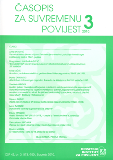Hrvatska protukomunistička gerila u Bosni i Hercegovini od 1945. do 1951.
CROATIAN ANTICOMMUNIST GUERILLA IN BOSNIA-HERZEGOVINA, 1945-1951
Author(s): Ivica LučićSubject(s): History
Published by: Hrvatski institut za povijest
Keywords: Communists; Croatian anticommunist guerilla; Outlaws; Ustasha; Herzegovina; Bosnia; Yugoslavia; Church
Summary/Abstract: Communist party of Yugoslavia was victorious at the end of World War II and it was able to reestablish the Yugoslav state under its rule. Using the army, police and security services it took measures to secure its power. Individual members and gropus of the defeated Croatian armed forces tried to resist the communist regime. These soldiers of the former Independent State of Croatia became guerillas who more or less successfully tried to resist the new authorities or at least wanted to hide from its persecution. These guerillas had various names (križari, šumnjaci, kamišari, škripari) and the communist authorities called them “outlaws” or “bandits”. The Croatian guerrillas hoped that there would be a new world war between western powers and the Soviet Union and they believed that would give them the opportunity to destroy the communist regime and reestablish independent Croatian state. Others waited for the amnesty and tried to survive in the meantime, hoping that they would be able to return to normal life. Communists saw these guerillas as a potential danger in the case of new world war and at the same time they danger to the new social order. The struggle of the communist authorities against these guerillas was also used to discipline the population that was not inclined toward the new authorities and to crush other opposition such as the Catholic church. Guerillas sometimes attacked and killed communists, soldiers and secret policemen, but also the civilians who supported the new regime. Most of the guerillas were finally killed by the communist authorities and some were sentenced to long prison sentences. Many of the civillinas who supported guerillas or were just accused of supporting them were also terrorized or killed. The communist authorites also deported or cut food supplies to the local population or used them as live shields in the attacks on guerilla strongholds. Many of these civilan victims were women and children. The Croatian guerilla movement finally ended after the split between Yugoslav communist regime and the Soviet Union after which Yugoslavia gained the support of the western powers.
Journal: Časopis za suvremenu povijest
- Issue Year: 42/2010
- Issue No: 3
- Page Range: 631-670
- Page Count: 40
- Language: Croatian

